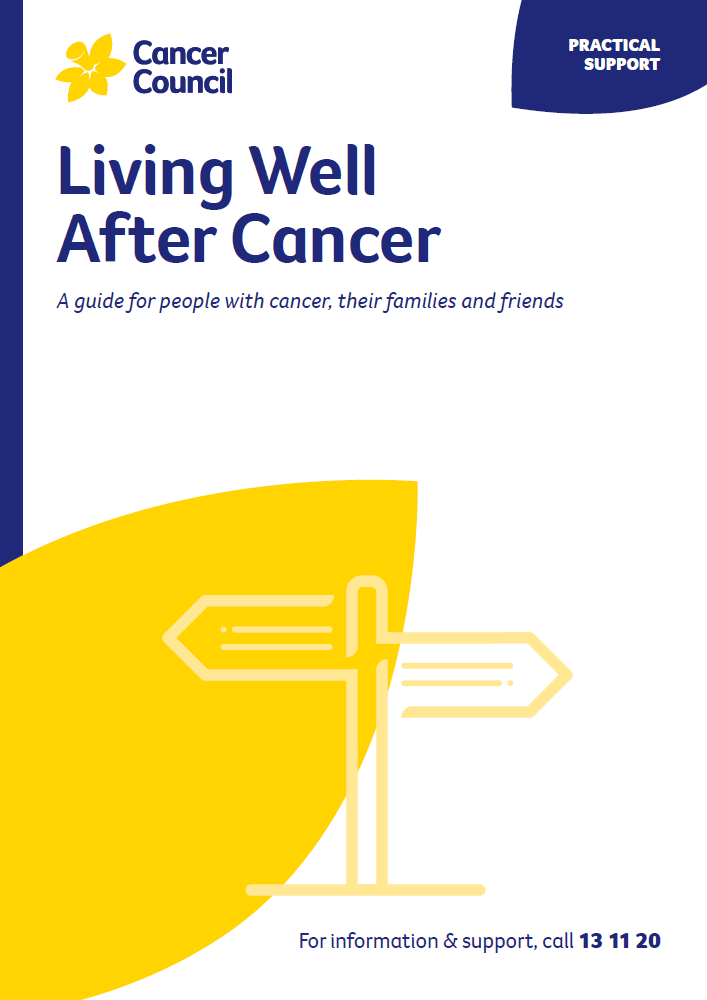- Home
- About Cancer
- Living well
- Living well after cancer
- Adjusting to life after treatment
- Finding a “new normal”
- Adjusting to the new normal
Adjusting to the new normal
The cancer experience doesn’t stop when treatment ends. Give yourself time to adjust to life after treatment. It can be helpful to take each day as it comes and accept that you may have both good and bad days. Everyone is different, but you may find some of the following suggestions useful.
Reflect on your lifeThink about your goals and priorities. It may be helpful to write down how you’re feeling in a journal or to ask yourself:
|
|
Look after yourselfTake the time you need to get used to any changes in your body. Do things at your own pace and rest between activities. Remember, your body is still healing. If you are worried about going out, ask someone to go with you. |
|
Take time for yourselfMake time each day to do something you find relaxing or enjoyable. This could be reading, listening to music, spending time in nature or taking a bath. |
|
Talk about your emotionsAcknowledge your feelings. It may help to share any concerns or worries with your family and friends, your doctor, a psychologist or counsellor. |
|
Manage your wellnessThink about ways you can manage your own wellness and make changes to improve your quality of life. Eating healthy food and being physically active can help your body cope with physical and emotional stress, and make you feel as though you are doing something practical to help yourself. |
|
Clear your mindComplementary therapies, such as relaxation, yoga, mindfulness meditation and visualisation, may increase your sense of control, relieve stress and anxiety, and improve mood. |
|
Seek supportConnecting with others who have been through a similar experience may be helpful. Join a support group, attend a survivorship program, listen to survivorship webinars or read stories from other survivors. |
|
Manage side effectsYou may have ongoing side effects after treatment. Talk to your health care team about ways to improve or manage any symptoms. |
→ READ MORE: Myths about the end of treatment
Podcast: Finding Calm During Cancer
Listen to more of our meditation and relaxation podcast.
More resources
Prof Michael Jefford, Medical Oncologist and Director, Australian Cancer Survivorship Centre, Peter MacCallum Cancer Centre, VIC (clinical review); Lucy Bailey, Nurse Counsellor, Cancer Council Queensland; Philip Bullas, Consumer; Dr Kate Gunn, Clinical Psychologist and Senior Research Fellow, Department of Rural Health, University of South Australia, SA; Rosemerry Hodgkin, 13 11 20 Consultant, Cancer Council WA; Prof David Joske, Clinical Haematologist, Sir Charles Gairdner Hospital and Clinical Professor of Medicine, The University of Western Australia, WA; Kim Kerin-Ayres, Clinical Nurse Consultant, Cancer Survivorship, Concord Hospital, NSW; Sally Littlewood, Physiotherapist, Seymour Health, VIC; Georgina Lohse, Social Worker, GV Health, VIC; Melanie Moore, Exercise Physiologist and Clinical Supervisor, University of Canberra Cancer Wellness Clinic, ACT; June Savva, Senior Clinician Dietitian, Nutrition and Dietetics, Monash Cancer Centre, Monash Health, VIC; Dr Elysia Thornton-Benko, Specialist General Practitioner and Research Fellow, University of New South Wales, NSW; Prof Janette Vardy, Medical Oncologist, Concord Cancer Centre and Professor of Cancer Medicine, The University of Sydney, NSW; Lyndell Wills, Consumer.
View the Cancer Council NSW editorial policy.
View all publications or call 13 11 20 for free printed copies.

